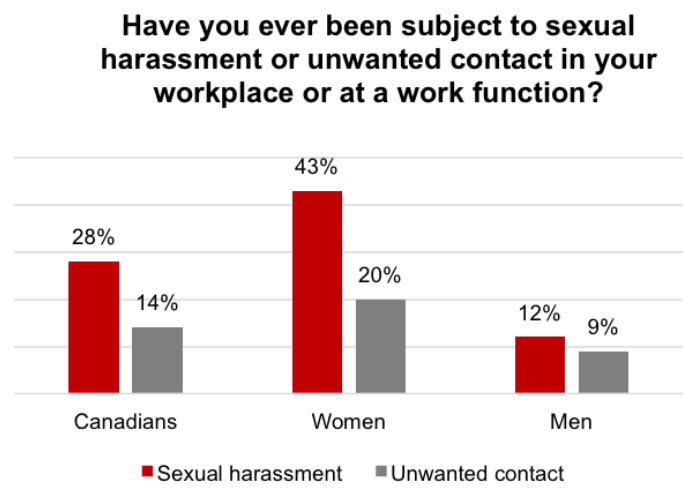Culture starts at the top of the organization. The bottom line is that its the organization’s leaders who must take responsibility, lead the charge, for making the workplace safe, free of unwanted sexual harassment.
Sexual harassment in the workplace is pervasive
The American Heritage Dictionary gives the sexual harassment definition as:
The making of unwanted and offensive sexual advances or of sexually offensive remarks or acts, especially by one in a superior or supervisory position or when acquiescence to such behavior is a condition of continued employment, promotion, or satisfactory evaluation.
What constitutes the legal definition of sexual harassment is the fact that the sexual advances are “unwanted” or “unwelcome” by the victim.
Not withstanding ubiquitous headlines related to toxic workplaces (e.g., Uber and others), here’s some Canada statistics, courtesy of an Angus Reid 2014 poll, highlighting the scope of the problem:
Four principles to reduce sexual harassment in the workplace
In last Saturday’s Globe and Mail, leadership expert, Merge Supta-Sunderji, provided key principles for leaders to keep in mind; principles that foster safer workplace cultures, where employees aren’t subjected to unwanted innuendo, or worse. I paraphrase and share Supta-Sunderji’s advice:
1. Look for a relationship power imbalance.
Question whether there is a disparity in positional or influential authority, real or perceived. The onus is always on the person who has greater authority in the relationship to ensure that the lesser power is not being taken advantage of.
2. Listen for the word “no”.
It means exactly that. “No” does not mean “maybe”.
3. Respond appropriately to reciprocal relationships.
Even if emotions are reciprocal, think it through; (a) seek to remove the real or perceived differential (point 1 above) by reassigning work responsibilities; if that’s not possible, then (b) declare the potential conflict of interest to an appropriate third party so as to sidestep any future allegations of sexual misconduct.
4. Stop the bad behaviour, now.
If you’re observing or hearing about unwanted advances among your staff, shut it down. Make it clear that any inappropriate comments of a sexual nature are unacceptable. If you observe such behaviour yourself, address it immediately. If you hear rumours that this is occurring, pull Human Resources in right away to address the gossip and speculation before it spirals out of control. Whatever you do, don’t get caught up in the crowd mentality that causes harassment to snowball: Just because “everyone” does or says it doesn’t excuse inappropriate behaviour or comments. As a leader, you have a responsibility to create a harassment-free workplace culture.
In combination with…
Combine the (above) principles with these diverse workplace strategies that benefit women, for a healthier, more productive, workplace. Affirmative action is an advantage.
Workplace expectations are changing. What was once acceptable, no longer is, or are old ways still accepted, albeit in a different guise?
In my home province, our occupational health and safety regulatory body, WorkSafeBC, mandated new anti-bullying and harassment laws in 2013. On a related front, Ontario introduced new workplace laws this year.
That’s the good news.
The other news is that while employers are required to follow these new regulations, effective implementation and enforcement is a challenge, especially in some sectors; e.g., tech industry mired in ‘bros’ culture, discrimination in construction industry…
My experience working with local businesses is that old ways change slowly. They change faster with the benefit of intentional, constructive, and fairness-based leadership.
Here’s a Respectful Workplace Checklist that you can download. I’ve adapted it from a similar WorkSafeBC version. Use the checklist to assess how well your organization demonstrates a respectful workplace, and to identify areas for improvement.
——————————-
[Collaborative Journeys provides conflict management services for small to medium-sized businesses, nonprofits and local governments. Contact Ben for a free consultation.]


Speak Your Mind